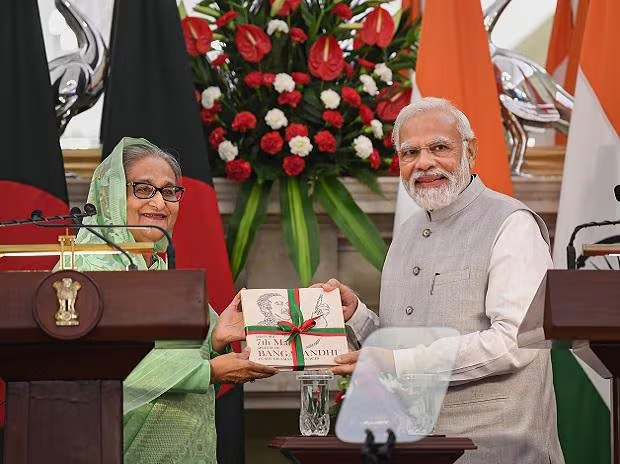“Over the last year, our two nations have covered significant ground in sectors like infrastructure, connectivity, trade and energy,” PM Modi
 KRC TIMES National Bureau
KRC TIMES National Bureau

NEW DELHI : The modernisation of Bangladesh’s armed forces, conservation of Teesta water and e-visas for medical patients are among the slew of new initiatives announced during Prime Minister Sheikh Hasina’s official visit to India.
“Glad to have welcomed PM Hasina to Delhi, over the year we have met over ten times but this visit is special because we she is our first state guest after our government returned to power for the third term,” said Prime Minister Narendra Modi on Saturday.
“In line with the plans for modernization of the Bangladesh Armed Forces, we will explore defence industrial cooperation for modernization of the Armed Forces of Bangladesh, to strengthen their capability for defence. We will continue to work closely with Bangladesh for our multifaceted military engagements of exercises, training and capability development,” said the joint statement.
PM Modi and PM Hasina reviewed cooperation on water resources, security and enhancing a strong framework on disaster management. “Over the last year, our two nations have covered significant ground in sectors like infrastructure, connectivity, trade and energy,” PM Modi added.
PM Hasina came to India at the invitation of PM Modi and this was her first official overseas state visit to any country since she returned to power in January. “India is our major neighbour, trusted friend and regional partner. Bangladesh-India relations are growing at a fast pace. I invite PM Modi to visit Bangladesh,” said PM Hasina.
Effect of Covid Final . Around 10 Memorandums of Understanding (MoU) were signed between the two leaders and many announcements made.
The new announcements include e-visa for patients from Bangladesh, new Assistant High Commission of India in Rangpur, new train service between Kolkata and Rajshahi, new bus service between Chittagong and Kolkata, joint technical committee for Ganga Water Treaty, Commencement of export of 40 mw of power from Nepal to Bangladesh through Indian grid, visit of technical delegation on conservation of Teesta River inside Bangladesh and training of Bangladeshi police officers amongst others.
Meanwhile, the two leaders jointly articulated their shared vision for peace, prosperity and development of the two neighbours and the entire region, driven by connectivity, commerce and collaboration.
As part of sub-regional connectivity initiatives, India will extend transit facilities for movement of Bangladesh goods to Nepal and Bhutan through the railway network. A new MOU has been inked on railway connectivity, while a decision was taken to commence goods-train service from Gede-Darshana through Chilahati-Haldibari up to Hasimara via Dalgaon railhead (as and when operationalized) at the India-Bhutan border.
“We will continue to expand our power and energy collaboration and together develop intra-regional electricity trade, including of competitively-priced power generated from clean energy projects in India, Nepal and Bhutan, through the Indian electricity grid.
To this end, we will expedite the construction of 765 kV high-capacity interconnection between Katihar-Parbatipur-Bornagar with suitable Indian financial assistance, to act as the anchor for our grid connectivity,” says the joint statement.
There were discussions on early commencement of negotiations for a Comprehensive Economic Partnership Agreement (CEPA), early operationalization of two Special Economic Zones (SEZs) offered by Bangladesh to India in Mongla and Mirsharai, opening of new border-haats, trade facilitation to enhance bilateral trade, improving road, rail, air, and maritime connectivity and trade infrastructure.
Meanwhile a Joint Technical Committee has been formed to initiate discussions for the renewal of the Ganges Water Sharing Treaty of 1996. As part of development cooperation, India will also undertake conservation and management.



